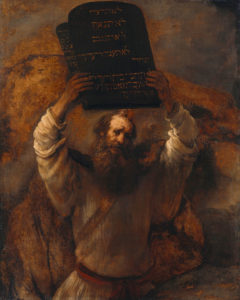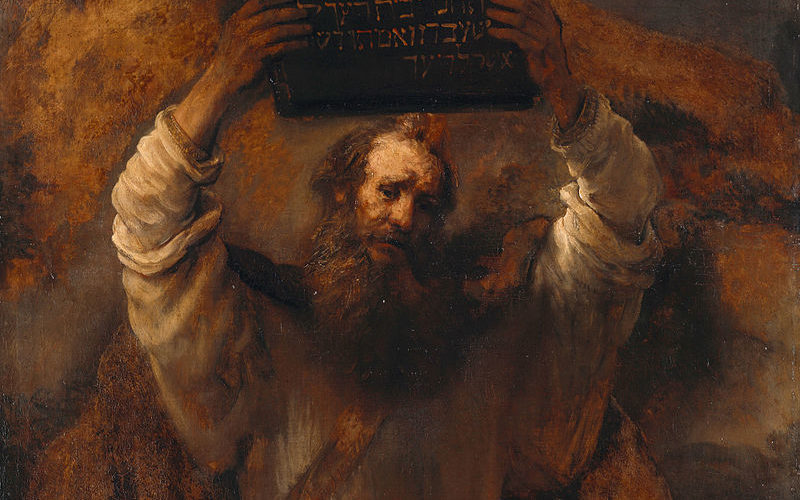Love as Fulfilment

For the 19th Sunday in Ordinary Time.
Language is fascinating. One of my favourite joys is being blown away and astonished by a word, or a phrase. The gift of language is as much a sign that God loves us as it is a sign that God has a sense of humour. A word that is not nearly one of my favourites, but that its mere existence I find remarkable, wonderful, and amusing, is: Hangry.
Being the type of person who won’t eat unless reminded to, I hardly ever even get hungry, let alone hangry. But I most certainly have experienced the phenomenon. I’ve had people I love be pretty nasty to me; then, given the circumstances, that word, ‘hangry’, will occur to me, make me smile, and then I’ll hand someone something to eat.
There is a thread in the tradition that interprets the bread Jesus gave to the people as symbolic of doctrine, in contrast to the bread associated with Moses and the law, and is telling the people that they should now choose the bread that is the bread of life, Jesus himself. So I thought I might explore an aspect of this, especially since at first glance this teaching might seem antiquated or strange.
Just as Jesus notes that it was not Moses who gave the peoples’ ancestors bread, but God, we can note that it is not Moses who gives the people the 10 commandments of the covenant, or the Decalogue, but God who gives them to Moses, who then teaches them. Each of the commandments uses the second person singular, and so can be seen as God addressing each singular person: ‘You’. Often we see these commandments merely as a series of prohibitions, ‘You shall NOT…’. However, it is important to remember that more fundamentally, this is the offer of an unbreakable bond of love and trust, spoken to each of us, by God. God is essentially saying here, ‘do this and you will live well, in good relation to God and neighbour’. It is addressed to the particular person, but it is essentially a guide to how each person should be directed outward, toward God and each other, and so is a guide to proper community life. Follow these rules and you will thrive as a community, on the path to fulfilment.
Even closer to the essence of the Decalogue is that, as a whole, it is about love; loving the right things, not the wrong things. It directs one toward a deeper understanding of what real love is. The structure of the Decalogue is such that the first and last commandments draw all of the commandments together into a unity, and this unity offers a fundamental orientation for desire in all aspects of life. The first commandment basically says: only worship God, and nothing else. The last says: ‘You shall not covet your neighbour’s house. You shall not covet your neighbour’s wife, or his male or female servant, his ox or donkey, or anything that belongs to your neighbour.’ These seven particular things, with seven being a completion number, signify that we should not ‘covet’ anything inappropriately. Not only is it forbidden to steal those things, we must not even long for them. In short, do not misdirect your desire. Desire in a way that contributes to the flourishing of relationship with God and neighbour, and not in a way that diminishes. As Benedict XVI writes:
‘The law of God is not to be seen as a concentrate of ‘nos’ that are an end in themselves, but as the door of access to the great ‘yes’ that opens up to God and to life. The commandments are not chains that bind humans, but an antidote to the seductions, the passions, the unfettered desires that give the illusion of a limitless freedom, while in reality are false conquests that debase existence and make it empty. Placed in the right perspective, these laws are therefore to be considered as essential references for a life project directed to responsibility, fidelity and love, and therefore based on solid and enduring values that generate true freedom and the joy of living.’
This understanding is also visible in the prophecy of Ezekiel: ‘I will give you a new heart and put a new spirit in you; I will remove from you your heart of stone and give you a heart of flesh.’ As well as Jeremiah when he foretells of the New Covenant: ‘For this is the covenant that I will make with the house of Israel after those days, declares the Lord: I will put my law within them, and I will write it on their hearts. And I will be their God, and they shall be my people.’ Herein we also see that there is a perennial tendency not to see the particular laws as a unified disposition, truly appropriated as the compass of one’s life. This is as much the case in the time of Moses, the prophets, Jesus, and our own. The bread becomes stale to us; we tire of it, and so fail to incorporate it into our lives.
We can see that part of what is meant by the idea that Jesus comes to fulfil the Law, not to abolish it, is the full realisation of the Word made flesh, embodied and enacted, demonstrating what it looks like to live a life fully devoted to love of God and neighbour. In John’s gospel there is a particularly vivid movement in the disciples toward being called friends by Jesus, abiding ever more fully in the love of God, as characterised by the new commandment: ‘Love one another. As I have loved you, so must you love one another.’ The gospel is building to this, though at this stage the teaching of Jesus himself being the bread is too difficult for people to handle. We’ll see that many people are put off by this idea, radically expressed by Jesus, of feeding on his flesh—understandably so. Even the twelve express having great difficulty with this idea, and many of the other followers simply go away.
John’s gospel, perhaps, gives us something of a guide as to the movements or developments that take place in coming to understand Jesus and enter into fuller relationship, and I think it bears some resemblance to how God reveals Godself to Moses, although here God is revealed in the full humanity of Jesus, image of the Father, in the flesh. In the famous scene of Moses coming learn the divine name, he is first drawn in by a wondrous sign—the burning bush, engulfed in flames, but not being consumed. Then there is a kind of correction that Moses undergoes: he is told to stop, go no further, take off your shoes. God gives Moses a directive, but Moses is apprehensive and so asks for the name of the one sending him. God reveals the totally confounding name, YHWH, often translated as ‘I Am who I Am’. God then reveals even more of what will happen as Moses is trying to grapple with this name that defies his conceptual grasp. Moses then enters into radical trust as he fully relies upon God’s fidelity, trusting that God will be there when Moses goes to challenge Pharaoh.
Something similar happens in the course of John’s gospel: the sign that draws and attracts, the correction, a directive, resistance and having to expand one’s consciousness, more explicit revelation, and the entrance into a relationship of trust—part of which we see in the reading here. Jesus performs signs and people are drawn in. Jesus corrects their misunderstandings, for instance in telling them that they did not understand his sign, and that he is not like Moses. He reveals that he is the true bread from Heaven, and the bread of life. Again they misunderstand, and he corrects them, saying: ‘stop murmuring’, then revealing more and more, relying upon the various I Am statements. It takes time for the people to adjust their thinking and grapple with what he is saying, if they are able at all. We will see that he issues the directive, to eat his flesh, which again will be very difficult for the disciples to understand. And eventually we will see, as the consummation of his ministry approaches, how Jesus ultimately calls them friends, as they abide and enter in to increasingly deep relationship of love and trust, in agapeic community, continuing to carry out God’s work.
This is perhaps a bit much, but the upshot is: that it takes a lot of adjustment to move from seeing purely at the surface level, toward deeper and deeper understanding of who Jesus really is; all the while growing into a more firmly established bond of love and trust. This is a radical transformation, whereby we strive to embody the love that Jesus embodied, and cultivate the relationship of love toward God and neighbour that he taught and demonstrated, and still teaches us, as our inner teacher.
Of Course it is not always easy to be like this. We can get hangry, if you will. As the letter to the Ephesians notes, similar to the earlier prophetic tradition, we have to be reminded not to succumb to our weaker selves. We can probably all think of times when we have behaved in such a manner likely to have disappointed the Holy Spirit. There are many states of mind that collapse our imagination back down to seeing merely in a superficial manner. We can embody the small-mindedness the ego, rather than the magnanimity of the Imago, causing us to hold on to ‘bitterness, fury, anger, shouting, and reviling’, as well as ‘malice’. This is why we need each other, keeping one another on track, through love, support, and at times ‘fraternal correction’. Ultimately, this is why we are reminded with our ‘daily bread’ that we are not self-sufficient. We are our best selves when we allow ourselves to be oriented and reoriented, as we try to be true to the way of love that is emblazoned on our hearts, so we might know how best to concretely manifest that love in offering ourselves for one another. The core symbol at the heart of Christianity, is the most commonplace staple of life—bread. It unifies the ‘spiritual’ and the ‘corporeal’, the mundane and the mysterium tremendum. We can see bread on the surface level, and we can see in a transformed way bread that is the Body of Christ. When we consume this bread, we are transformed into the Body of Christ. We are incorporated into the Divine mystery that is love.
This is the meaning of ‘sacrament’: we see one thing, and grasp another. We learn to see in a way that is sacramental; seeing things for what they really are. When we truly appropriate this way of seeing, it fundamentally transforms how we see the world. What we see might be the material world around us, while what we grasp, is the reality, of God’s self-giving, self-communicating love. And that changes everything.
